JOINT REVIEW: Napoleon the Great, by Andrew Roberts
Napoleon the Great, Andrew Roberts (Penguin UK, 2015).
The following is an email exchange between the Psmiths, edited slightly for clarity.
Jane: So, at what point in this book did you realize we went to college with Napoleon Bonaparte?
Andrew Roberts is very good at communicating the fundamental character of the people he writes about. When we first read this book together, I liked it so much that I followed it up with the new Roberts biography of George III. That one also left me feeling like I knew the man, but since George III is a lot less interesting than Napoleon I think it's very skippable. (Most interesting takeaway: bipolar I, not porphyria. Second most interesting takeaway: why are all the Hanoverians so middle class? Does it have to do with being German?) But Napoleon—!
He's so modern, so recognizable. I mean, which of us hasn't stayed up all night writing angry pamphlets about why everyone else is wrong and explaining to our friends how we would reorganize society? Except then someone gave him an army and he did it! You have to wonder whether we were missing the opportunity or just the nerve.
John: Probably the moment when he was made an honorary member of the French Academy of Sciences, and got so excited he started wearing the equivalent of a white lab coat around Paris, because now he was a scientist. Napoleon: intolerably Reddit.
But like if Reddit were dynamic and cool and a little bit the übermensch. I think my favorite big picture thing about the Roberts book is the way it cuts through two centuries of Anglophone ignorance and really shows you why the continent flung itself at this man's feet. The pop culture image of Napoleon as this little bumbling dictator is so clearly a deliberate mystification by the perfidious British who felt inadequate in the shadow of this guy they (barely) beat.
Remember, the real Napoleon was so impressive he literally caused a crisis in 19th century philosophy! Everybody had carefully worked out their little theories, later exemplified by Tolstoy, about how human agency doesn't matter in history and everything is just the operation of vast impersonal forces like the grinding of tectonic plates, and then boom this guy shows up and the debate springs to life again. You know it's real when two guys as different as Nietzsche and Dostoevsky are both grappling with what we can learn from somebody's existence. And I think Raskolnikov's unhealthy Napoleon fanboyism was supposed to be a bit of a satire of some very real intellectual currents among the European and Russian intelligentsia.
So what do you think? Does Napoleon vindicate the great man theory of history? I'm still working out my own answer to this, which I briefly allude to in my review of Zhuchkovsky's book. Basically, I think we can transcend the traditional dichotomy by constructing a political/military analogue of the Schumpeter/Kirzner theory of entrepreneurship. Vast, impersonal forces (such as technological progress or structural economic changes) can create opportunities — in fact they're pretty much the only thing that can, because the force required to reconfigure society is usually far beyond what any person or group can manage.
But once the opportunity is there, it takes a lot less raw power to act on it, assuming you can recognize it. Imagine a process of continental drift that slowly, slowly raises a mountain-sized boulder out of the ground, and every year it's inching closer to this precipice, until finally it teeters on the edge. A human being could never have done that, it would be far too heavy, but once it's up there, there might be a narrow window, a few precious moments, when a solid shove by somebody sufficiently perceptive and motivated can direct and harness this unimaginable force.
So the question is: what made Europe so ripe for Disruption (TM) at that moment? Obviously the French Revolution, and there were some pretty important changes in the nature of warfare too. What else?
Jane: Well, you know what I’m going to say: it’s the Enlightenment, stupid.
I was going to compare Napoleon to, say, Odoacer, but I don't think the analogy actually holds. The Goths were conquerors from outside; their approach, their whole worldview, was very different from the Romans'.1 But Napoleon is extremely inside. The people he comes from are not actually all that different from the ancien régime — they're feuding hill clans, but they're aristocratic feuding hill clans — and yet he's so thoroughly a creature of Enlightenment modernity that even when he's engaging in the time-honored feuding hill clan pastime of resisting integration by the metropole he's doing it by writing pamphlets. He might be a Corsican nationalist but he's been intellectually colonized by France. Or, more accurately, by the elements of French culture that are in the process of undermining and overthrowing it.
I think you're right about political entrepreneurship. (So here we see the Psmiths wimp out and answer the great man/impersonal force dichotomy "yes.") It's perhaps more neatly summed up by that famous Napoleon quip: "I saw the crown of France lying on the ground, so I picked it up with my sword." Which: based. But also, if we're going to continue his metaphor, he didn't knock the crown onto the ground. Everything was already irredeemably broken before he got there. And this, I think, distinguishes him from the Germanic conquerors, who found something teetering and gave it a final push. Caesar, similarly, came up in the old order but dealt it its death blow.
But back to the Enlightenment: the crown is on the ground because the culture that held it up has fallen apart, and it's fallen apart because gestating in its innards was an entirely different culture that's finally burst its skin like a parasitic wasp and emerged into the light of day. A lazy reading of history sees Napoleon with a crown giving people titles and building palaces and goes "ooh, look, he's just like the ancien régime," but this is dumb. Napoleon is obsessed with modernizing and streamlining. He wants to wipe away the accumulated cruft of a thousand years of European history and build something smarter and cleaner and more rational. He's just better at organization and psychology than the revolutionaries were. The French Revolution (and the total failure of the Directory) created the material conditions, but the entire intellectual milieu that made the French Revolution possible also made it possible for people to look at Napoleon and go "whoa, nice."
The most affecting episode in the whole book, to my mind — even more than his slow rotting away on St. Helena — is Napoleon's conferences with Alexander I at Tilsit. Here are these two emperors meeting on their glorious raft in the middle of the river, with poor Frederick William of Prussia banished from the cool kids' table, and Napoleon thinks he's found a peer, a kindred soul, they're going to stay up all night talking about greatness and leadership and literature... And the whole time the Tsar is silently fuming at the audacity of this upstart and biding his time until he can crush him. The whole buildup to the invasion has a horror movie quality to it — no, don't go investigate that noise, just get out of the house Russia! — but even without knowing how horribly that turns out, you feel sorry for the guy. Napoleon thinks they have something important in common, and Alexander thinks Napoleon's very existence is the enemy of the entire old world of authority and tradition and monarchy that he represents.
Good thing the Russian Empire never gets decadent and unknowingly harbors the seeds of its own destruction!
John: Yeah, I think you've got the correct two finalists, but there's one episode in particular on St. Helena that edges out his time bro-ing out with Tsar Alexander on the raft. It's the supremely unlikely scene where old, beaten, obese, dying Napoleon strikes up a bizarre friendship with a young English girl. It all begins when she trolls him successfully over his army freezing to death in the smoldering ruins of Moscow, and after a moment of anger he takes an instant liking to her and starts pouring out his heart to her, teaching her all he knows about military strategy, and playing games in her parents' yard where the two of them pretend to conquer Europe. Call me weird, but I think this above all really showcases Napoleon's greatness of soul. That little girl later published her memoirs, btw, and I really want to read them someday.
To me the central paradox of Napoleon's character is that on the one hand he was happy to fling astonishing numbers of lives away for ultimately extremely stupid reasons, but on the other hand he was clearly so dedicated to and so concerned with the welfare of every single individual that he commanded. In my experience both of leading and of being led, actually giving a damn about the people under you is by far the most powerful single way of winning their loyalty, in part because it's so hard to fake. Roberts repeatedly shows us Napoleon giving practically every bit of his life-force to ensure good treatment for his soldiers, and they reward him with absolutely fanatical devotion, and then... he throws them into the teeth of grapeshot. It's wild.
Napoleon's easy rapport with his troops also gives us some glimpses of his freakish memory. On multiple occasions he chats with a soldier for an hour, or camps with them the eve before a battle; and then ten years later he bumps into the same guy and has total recall of their entire conversation and all of the guy's biographical details. The troops obviously went nuts for this kind of stuff. It all sort of reminds me of a much older French tradition, where in the early Middle Ages a feudal lord would (1) symbolically help his peasants bring in the harvest and (2) literally wrestle with his peasants at village festivals. Back to your point about the culture, my anti-egalitarian view is that that kind of intimacy across a huge gulf of social status is easiest when the lines of demarcation between the classes are bright, clear, and relatively immovable. What's crazy about Napoleon, then, is that despite him being the epitome of the arriviste he has none of the snobbishness of the nouveaux-riches, but all of the easy familiarity of the natural aristocrat.
True dedication to the welfare of those under your command,2 and back-slapping jocularity with the troops, are two of the attributes of a wildly popular leader. The third3 is actually leading from the front, and this was the one that blew my mind. Even after he became emperor, Napoleon put himself on the front line so many times he was practically asking for a lucky cannonball to end his career. You'd think after the fourth or fifth time a horse was shot out from under him, or the guy standing right next to him was obliterated by canister shot, the freaking emperor would be a little more careful, but no. And it wasn't just him -- the vast majority of Napoleon's marshals and other top lieutenants followed his example and met violent deaths.
This is one of the most lacking qualities in leaders today — it's so bad that we don't even realize what we're missing. Obviously modern generals rarely put themselves in the line of fire or accept the same environmental hardships as their troops. But it isn't just the military, how many corporate executives do you hear about staying late and suffering alongside their teams when crunch time hits? It does still happen, but it's rare, and the most damning thing is that it's usually because of some eccentricity in that particular individual. There's no systemic impetus to commanders or managers sharing the suffering of their men, it just isn't part of our model of what leadership is anymore. And yet we thirst for it.
When did this change? I am tempted to blame it, like everything else, on the rise of meritocracy.
Jane: But Napoleon was a meritocrat, in the strictest and most literal sense. He made himself emperor through sheer excellence, and the men he elevated were the same. I mean, let's look at his first set of marshals: Augereau is the son of a fruit-seller, Ney's father was a cooper, Masséna's father was a shopkeeper, and Bessières' was a doctor (in an era when that was a lot less prestigious than it is today). Bernadotte starts out the son of a provincial prosecutor and ends up king of Sweden. Only Davout had an aristocratic background. Obviously this was sort of inevitable, because the previous elite had been literally decapitated and a new one had to come from somewhere. Maybe it’s just what happens when you have a particularly profound disruption: people end up in power because they’re better than anyone else at making war to get the power in the first place. Just like you can’t follow the lineage of any European aristocrat back farther than the Germanic conquerors of the early Middle Ages. (The Psmiths, as is well attested, trace descent from the Viking Psmiðr who came to Normandy with Rollo in the 8th century.) But I think it's more than that. Napoleon set up all kinds of meritocratic institutions outside the military: he had his competitive examination lycées, he was constantly promoting the talented young auditeurs he ran across in the Conseil... (Can you tell I liked the civil administration chapters better than the battle chapters? #thetwogenders)
So what is the difference between Napoleonic meritocracy and our present sort? I think the real difference is that in his case there was someone doing the choosing. This is important for a couple of reasons: first, because it takes a certain amount of talent to recognize excellence. You can get away with being a Salieri, but you need to have something. I think we've all seen institutions whose HR departments were so packed with drones that they couldn't have recognized a genius if one fell into their laps, let alone wanted to work for them. And it's way, way harder to keep around an institution full of competent intelligent people with correctly aligned incentives than it is to just...be good at identifying talent, personally. Second, a person exercising judgment can take a way more holistic view than any standardized metric. This is what college admissions claims to be trying to do when they're not just using it as an excuse to keep out Asians. But a well-functioning meritocracy — or an emperor picking his men — should be searching for excellence. Studying hard and doing well on a test not only fails to reliably indicate excellence, it actually encourages and cultivates habits of mind that undermine excellence.
But the biggest reason this is important, I think, brings us back to Napoleon again, and might be the key to what you described as the strange inconsistency between his loving concern for his men and his willingness to send them to a hideous death. Because I don't actually think it's an inconsistency at all! And it has to do with mission. What's the deal with our current meritocratic system? "We want to have the smartest people in power." Okay but why? "So they can be effective." Effective at what?
No one ever had to ask Napoleon "effective at what."
He was willing to throw himself, and his closest friends, and the meanest infantryman whose boots he nevertheless obsessed over, into some of the most hellish experiences yet devised by men4 in service of something greater. And you can be snide and say the something greater was "Napoleon," and that's sort of true, but to him and to France "Napoleon" had come to stand for law and knowledge and liberty and order and greatness itself. Napoleon's meritocracy worked because it had a telos. Our meritocracy is the idiot fluting of a blind inhuman blob.
There's some very interesting stuff on this, and about later efforts from both cultures to bridge the gap, in Bryan Ward-Perkins' The Fall of Rome: And the End of Civilization.
When not flinging them into the face of Prussian siege guns.
Okay, there are more than three. Some others include: deploying a cult of personality, bestowing all kinds of honors and awards on your men when they perform, and delivering them victory after victory. Of course, Napoleon did all of those things too.
Another book recommendation! The Face of Battle.



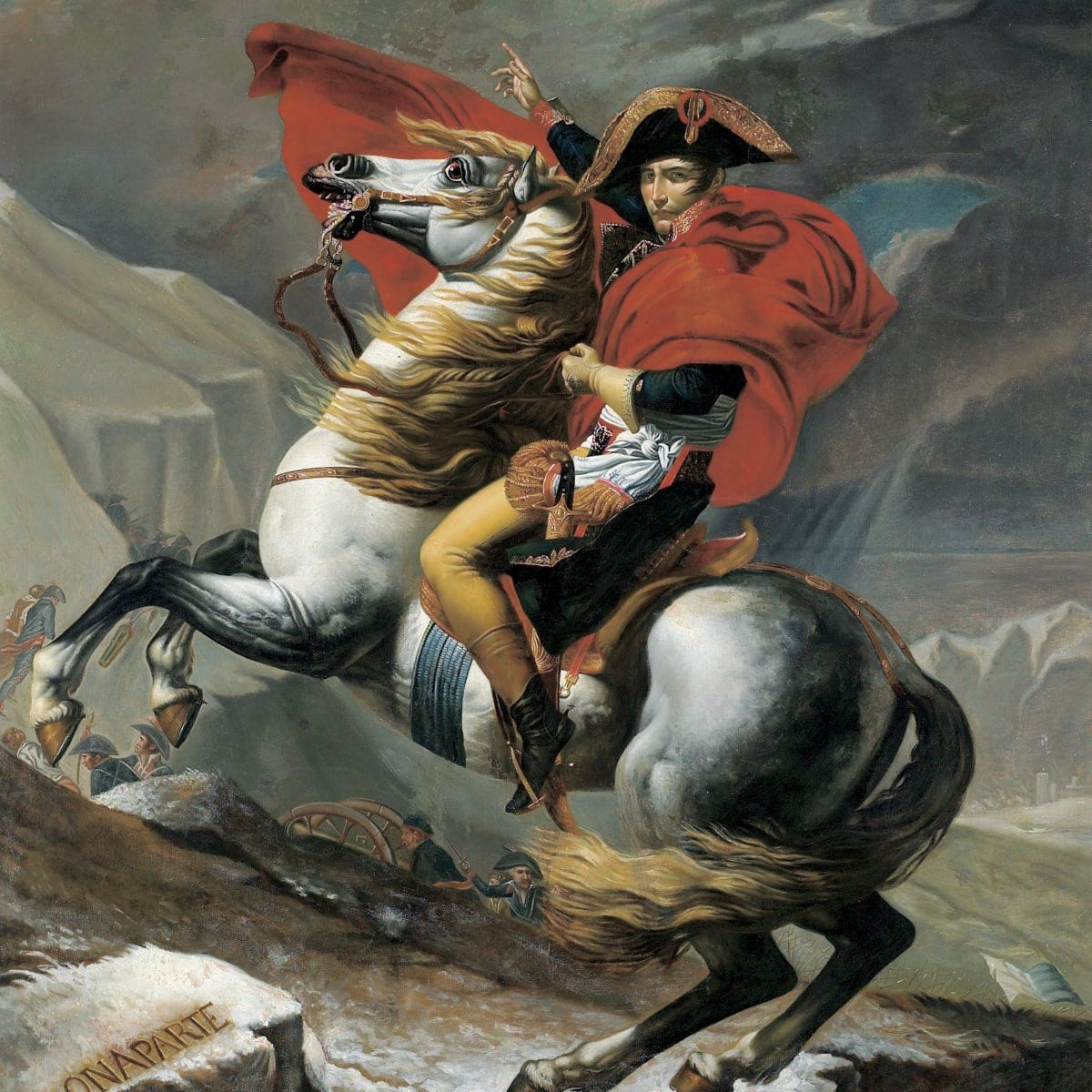
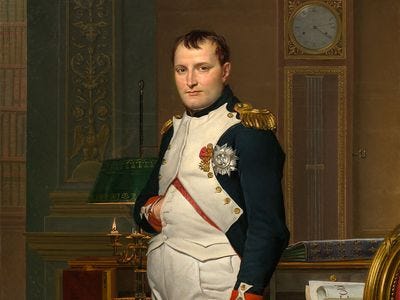
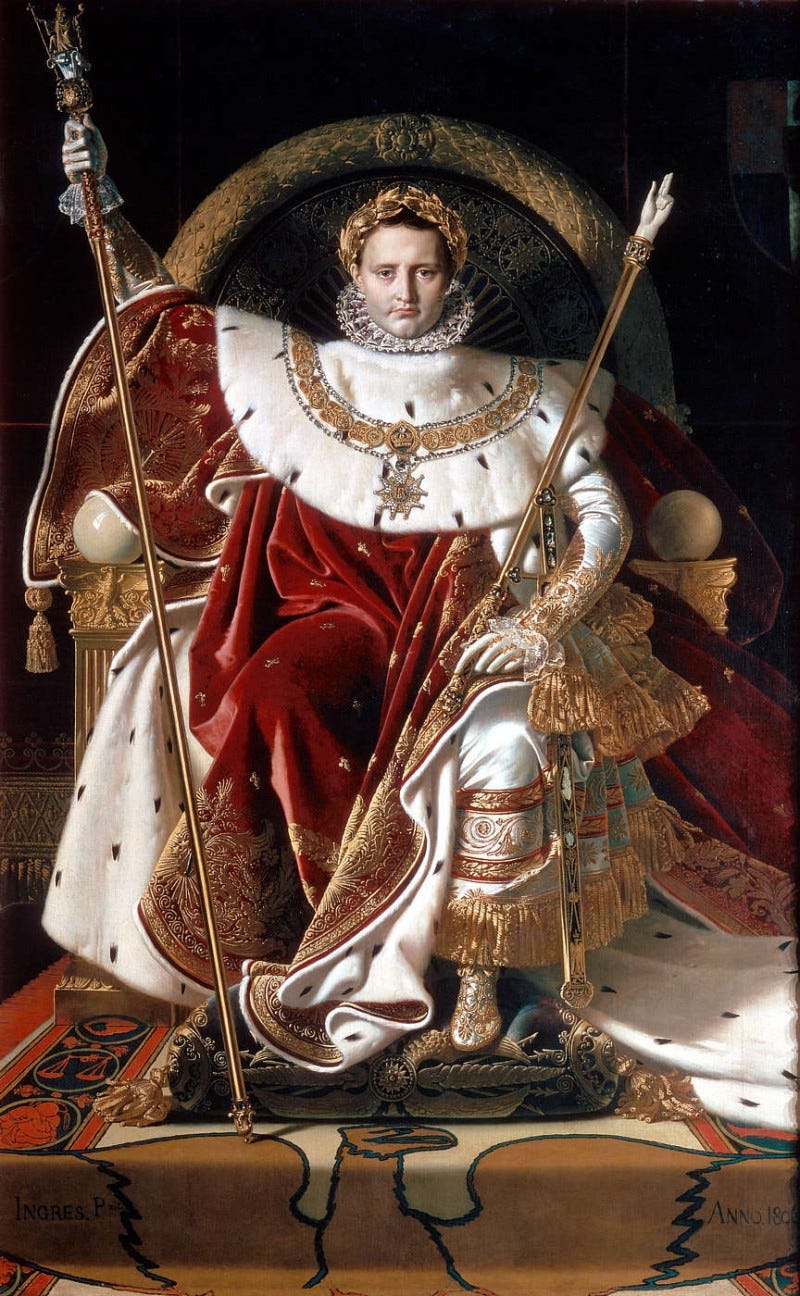
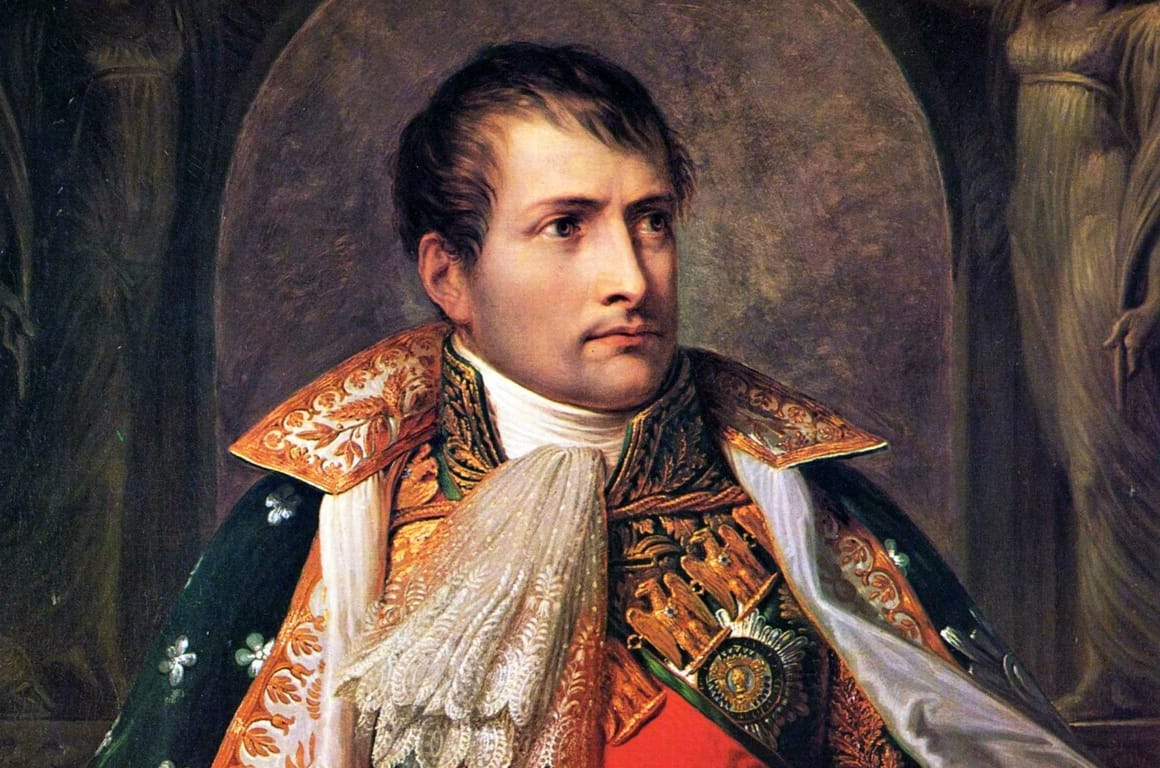
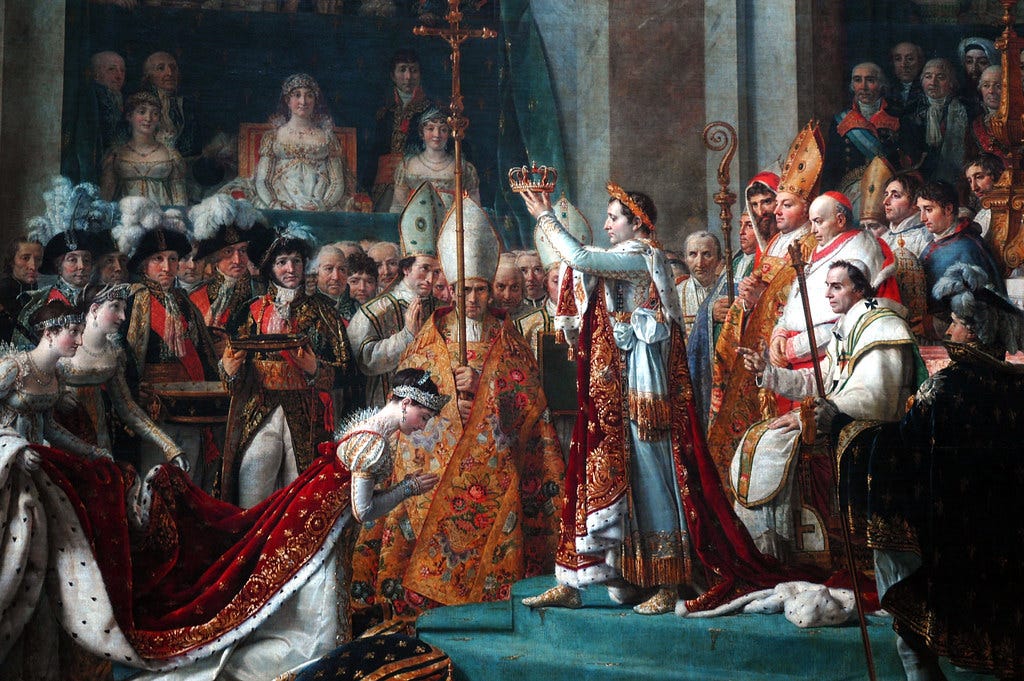
Tyler and I are friendly, we grew up for a time in the same city (his family moved out at age 10 I think) and I went to junior high with the older daughter of a neighbor of his there. My dad was a Napoleonophile, and many of his family in Nidwalden (Switzerland) are, I think going back some generations. I got interested in Napoleon a few years ago and started with the Andrew Roberts book, although Napoleon also plays a huge role in Thomas Nipperdey's standard history of Germany from 1800 to 1918, which I'd read decades previous, at the instigation of a historian cousin. Nipperdey says right up front that the trajectory of modern German history is unimaginable without Napoleon. After Andrew Roberts' book, I read Patrice Gueniffey's Bonaparte, and I much prefer it to Roberts and treasure it, but it ends in 1802. I hope Gueniffey produces a second volume some day. To me, Gueniffey "gets" the woven tapestry of French society (and the Corsica Napoleon left early for military school) where Napoleon fit and didn't, whereas Roberts to me lacks a feel of what to emphasize and not, especially where the roles of women in their mutual relations and context are concerned. For example, Roberts hardly mentions what stands out in Gueniffey's account, that Napoleon's mother was as much a constant mistress as a wife, with statuses and protections accruing. As to Tyler, had he gone to a French or a German school system, his sort of intellectual omnivorousness would have been exceptional but hardly freakish. It's the failures of Anglo school systems overall and their hostility to intellectuals that make European intellectuals (which Napoleon certainly was, but so are many others too) look to us like freaks, or get readily caricatured as "figures".
I think my some of these measures, Tyler Cowen is one of the most Napoleonic figures I know, combining the intense eye for talent with the knowledge and intimacy that everyone on CWT seems to be having the deepest convo of their life, with someone more familiar with their work than most of their friends/family.